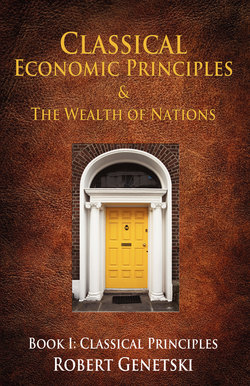Читать книгу Classical Economic Principles & the Wealth of Nations - Michael Ashley - Страница 5
На сайте Литреса книга снята с продажи.
ОглавлениеBasic Prinicples
History is the discovering of the constant and universal principles of human nature. —David Hume
Dramatic changes occurred in the latter part of the 18th century. The feudal system and agricultural economy gave way to the industrial revolution.
Prior to the industrial revolution understanding the economy was fairly easy. A workforce consisting of farmers and craftsmen was fairly easy to understand. Each person had a specific, easily understandable job. Most produced a finished product. Anything that was produced over and above what the worker needed was exchanged for finished products produced by others.
In the 17th century something new emerged. Machines replaced manual labor. Workers became less inclined to produce finished products. They instead became specialists, producing some part of a product.
Unlike the simplicity and order of the feudal system, the emerging system was chaotic. The pace of business increased dramatically. Then, as now, great changes led to great confusion.
Who should make key economic decisions?
In the feudal system, many decisions about production and distribution were made by a central authority. In the system emerging out of the industrial revolution, no one appeared to be in control. It was unclear just who would decide issues that were essential to fulfilling the needs of society.
What should be produced? How much of it? Who would produce it and how would it be produced? What would things be worth and how much should workers be paid?
There was confusion over how these crucial tasks could conceivably be accomplished without the aid of some central authority. People wondered how it would be possible to serve the nation’s interests without someone in charge of such critical decisions. Logic seemed to suggest that the end result would be chaos.
Adam Smith carefully studied the emerging system. He noted the lack of a central authority. He recognized the seemingly chaotic interplay of forces at work and reached a startling conclusion.
Within this seemingly chaotic system were the keys to creating the greatest amount of wealth for the greatest number of people. Individuals, freely going about their normal business and free to pursue their self-interests, would tend to promote the interests of society far more effectively than when guided by any central authority.
The keys to prosperity were not to be found in the decisions of some powerful, enlightened leader. Nor were they to be found in the guidance provided by a council of wise men or politicians. Such powerful authorities were more likely to undermine prosperity than promote it. Rather, the key to prosperity resides in the interaction of free individuals responding to their everyday needs.
Smith’s conclusions led to some basic principles that would enable nations to take full advantage of the wealth-creating potential of their people. These principles included an important role for government. However, instead of directing economic activity, government’s role was to ensure that individuals were provided the optimal environment in which to maximize their creative and productive energies.
With the right environment, individuals would combine resources in the most efficient way possible to provide things that other people wanted. The characteristics of a productive environment could be distilled to four essential principles:
Promote free markets.
Keep tax rates low and limit the role of government.
Protect individual property rights.
Provide a stable currency.
Each of these principles flow directly from a belief in each individual’s God-given right to liberty and freedom. As with liberty and freedom, the principles are so basic and fundamental that they apply to all people at all times.
Classical economists believed that these principles contained the keys to creating wealth. They had good reasons for these beliefs. We now turn to the reasoning behind each of these principles and examine why they are considered to be so important toward advancing the wealth of individuals and hence the wealth of nations.
